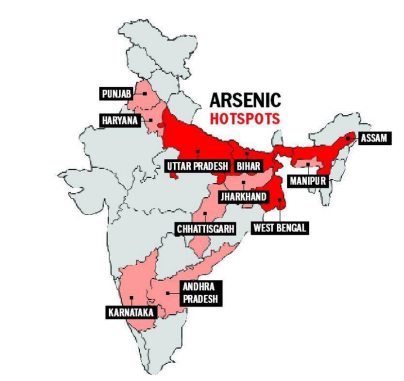
In the rapidly expanding urban landscape of India, groundwater contamination has emerged as a critical and pressing public health concern. As urbanization accelerates and populations burgeon, the demand for water resources intensifies, leading to increased reliance on groundwater. However, the unbridled growth and inadequate infrastructure development often contribute to the contamination of this vital water source. Pollutants from industrial discharges, improper waste disposal, and agricultural runoff infiltrate the underground aquifers, compromising the quality of the groundwater that millions rely on for their daily needs. This escalating problem poses significant risks to public health, as contaminated groundwater becomes a potential source of various waterborne diseases. Addressing the complex interplay of urbanization, pollution, and public health is imperative to safeguard the well-being of communities grappling with the consequences of rapid urban expansion in India.
Answer
According to a 2020 report by the Central Ground Water Board,70% of India’s groundwater is contaminated with at least one contaminant, in urban areas, up to 90% of groundwater is contaminated.

Reasons behind groundwater contamination in fast expanding urban areas:
Rapid Urbanisation
- Urban growth places tremendous pressure on water resources making it more susceptible to contamination
- Eg.80% of groundwater samples from different metropolitan cities in India were contaminated with faecal coliform bacteria (UNICEF).
Over-Exploitation of Groundwater
- Due to the increasing demand for water, groundwater is often over-exploited through excessive pumping, leading to a drop in water tables, increasing mobility of contaminants already present in aquifer.
Inadequate Sanitation and Sewage Management
- Untreated sewage can seep into the ground, polluting groundwater sources.
Industrial Pollution
- Industries located in and around urban areas release chemical pollutants and heavy metals into the environment,
- Can percolate into groundwater, posing health risks to nearby residents.
- E.g. study in Mumbai found that groundwater samples collected from near industrial areas were contaminated with toxic chemicals such as benzene, toluene, and ethylbenzene.

Unregulated Borewells
- Unregulated drilling of borewells for water extraction can introduce contaminants into the aquifers
- Contaminated water from shallower depths can mix with deeper, cleaner groundwater.
Chemical Agriculture
- The use of chemical fertilisers and pesticides in urban and peri-urban agriculture led to the contamination of groundwater with agricultural chemicals.
The consumption of contaminated groundwater can lead to a variety of public health issues including:
- Gastrointestinal diseases including diarrhoea, vomiting, and abdominal cramps.
- Long-term exposure to some of the contaminants found in groundwater, such as arsenic and chromium, can increase the risk of developing cancer.eg. A study in Bangalore found that people who lived in areas with high levels of heavy metal contamination in groundwater had a higher risk of developing cancer.

Residents
- Some of the contaminants found in groundwater can damage the nervous system, leading to neurological disorders such as Parkinson’s disease and Alzheimer’s disease.
- Some of the contaminants found in groundwater can interfere with the reproductive system, leading to infertility and birth defects.Eg. A study in Mumbai found that women who lived in areas with high levels of nitrate contamination in groundwater had a higher risk of giving birth to children with birth defects.
- Cognitive impairment in children exposed to contaminated groundwater eg. a Study in Delhi found that children who were exposed to arsenic-contaminated groundwater had a higher risk of developing cognitive impairments.
- Cause painful blisters on the skin with extreme itching and compromised mobility.
Water (Prevention and Control of Pollution) Act, National Hydrology Project (NHP), Jal ShaktiAbhiyan, and National Water Quality Monitoring and Surveillance Program are some steps in the right direction to curb this menace.
In case you still have your doubts, contact us on 9811333901.
For UPSC Prelims Resources, Click here
For Daily Updates and Study Material:
Join our Telegram Channel – Edukemy for IAS
- 1. Learn through Videos – here
- 2. Be Exam Ready by Practicing Daily MCQs – here
- 3. Daily Newsletter – Get all your Current Affairs Covered – here
- 4. Mains Answer Writing Practice – here

